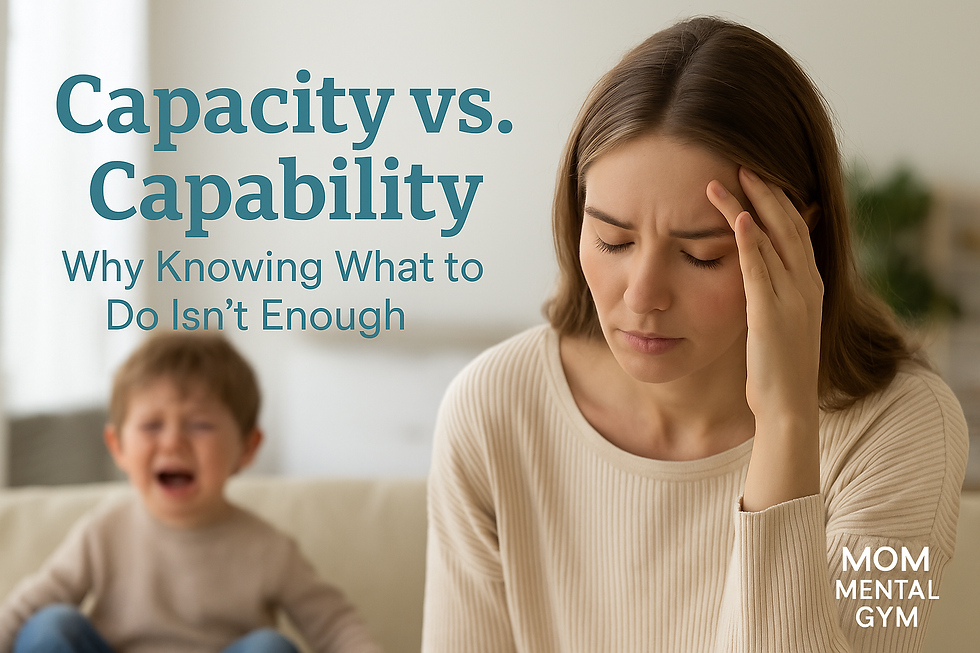Taming “More” Demands: Understanding Ungrateful Behavior in Children"
- Nov 23, 2023
- 4 min read
"But all my friends have it!"
"I really need this game; everyone else is playing it!”
"Why can't I go? It’s so unfair!"
"You never let me do anything fun with my friends."
"Everyone in my class has a phone; why can't I?"
"It's not fair; I'm the only one without one!"
"But how am I supposed to keep in touch with my friends?"
"But this brand is all anyone wears!"
Can you relate?

Guilt and Frustration: The Unspoken Side of Parenting
Raising kids is a beautiful, messy journey filled with moments that warm our hearts and, let's be honest, moments that leave us scratching our heads. One of those head-scratching moments? Dealing with ungrateful behavior in our children.
It’s natural for us, as moms, to feel guilt and frustration when our kids seem to overlook the value of things. But it’s not just about their behavior; it’s about our concern that maybe we’re not doing enough to instill gratitude in them. Have you been there? Let's understand ungrateful behavior in children.
The Complex Nature of Gratitude
I’ve had my fair share of these moments where the guilt and frustration crept in, making me wonder if I’m falling short in teaching my kids about gratitude. Perhaps you've felt it too— Our feelings of guilt often stem from our worry that we’re not doing enough, and the frustration stems from thinking they should know better because we’ve had countless conversations about being thankful.
But here’s the thing: it’s not as simple as we wish it were. It's not a one-and-done lesson or a quick fix. It’s a journey, and sometimes, it feels like a winding road with no clear destination.
I get it; it's tough not to feel guilty or responsible when our kids exhibit ungrateful behavior. But it’s not always about us. There are layers to this, and understanding them can help us navigate this tricky territory better.
Sometimes, it’s about control or lack thereof. Our kids might feel like they have no say in things that matter to them, which can breed that sense of dissatisfaction. Then there are developmental reasons—different stages or unique circumstances like autism that influence their responses.
Navigating Ungrateful Moments
Here are some responses a mother might use when addressing ungrateful behavior in children:
1.Whining for Material Items:
"I understand you really want it, but we need to wait and see."
"It's tough when it feels like everyone has something you want. Let's think about it together."
2. Demanding Expensive Outings:
"I know it's disappointing, but we can find something else fun to do."
"It's not about fairness; it's about what's best for us as a family right now."
3. Bargaining for Privileges:
"I appreciate your offer, but rules are rules. Let's focus on getting things done together."
4. Pressuring for Personal Devices:
"Having a phone is a big responsibility; let's discuss when the right time might be."
"I understand you want to keep in touch. Let's find other ways until we're ready for a phone."
5. Insisting on Expensive Fashion Items:
"Clothes are important, but let's find something more reasonable."
"I get that it's popular, but we'll find options that fit within our budget."
In each response, the focus is on understanding the child's desire while gently steering the conversation toward gratitude, budget considerations, or family priorities. This approach helps acknowledge the child's feelings while setting reasonable boundaries and teaching the value of gratitude and perspective.
Strategies for Cultivating Gratitude
Here are some strategies and reminders I've discovered along the way:
Lead by example. Our actions speak volumes, and kids learn by watching us.
Highlight acts of kindness and generosity. Help them notice and appreciate the goodness around them.
Make gratitude a part of everyday life. Turn it into a habit rather than a lecture.
Help them see things from different perspectives. Broaden their worldview.
Offer choices. Giving them autonomy fosters a sense of responsibility.
Engage and involve yourself in their lives. Sometimes, all they need is extra time and attention.
Incorporate gratitude walks into your routine. These walks are an incredible opportunity to focus on being present and appreciating the beauty that surrounds us.
Take a moment during these walks to pause and notice the wonders of nature. Comment on the magic of rain—how it nourishes the earth, waters our crops, and brings life to everything around us. Encourage your kids to appreciate the simple joy of raindrops, the warmth of the sun on their faces, the beauty of the fall-colored leaves, or the sound of the wind rustling through the trees. Engaging in gratitude walks and focusing on these moments, we not only teach our kids to be thankful for the world around them but also cultivate a mindset that embraces the beauty of everyday experiences.

Embracing the Parenting Journey
So here’s to us embracing the beautiful chaos of parenthood and weaving gratitude into the fabric of our daily lives. Let's support each other, knowing that these seemingly simple moments, like gratitude walks, are the building blocks of raising children who appreciate the world around them.
Parenthood is an expedition into uncharted territories, filled with moments of joy, laughter, and occasional frustration. Amidst the chaos, it’s the journey of shaping young hearts to appreciate the world around them that truly defines the beauty of being a parent.



Comments